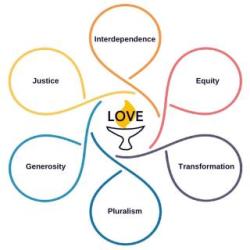 My recent article discussed Finding a Balance Between Individualism and Connectedness. This month I’m looking at the role of community, in both the physical and virtual aspects. In a world increasingly driven by individualism and material pursuits, the role of community in Spiritual Naturalism stands as a beacon of interconnectedness. This time I will explore the impact that a supportive community can have on our spiritual and naturalistic journey. From fostering emotional well-being to encouraging ethical growth, community is not just a backdrop but an active participant in the spiritual naturalist’s life.
My recent article discussed Finding a Balance Between Individualism and Connectedness. This month I’m looking at the role of community, in both the physical and virtual aspects. In a world increasingly driven by individualism and material pursuits, the role of community in Spiritual Naturalism stands as a beacon of interconnectedness. This time I will explore the impact that a supportive community can have on our spiritual and naturalistic journey. From fostering emotional well-being to encouraging ethical growth, community is not just a backdrop but an active participant in the spiritual naturalist’s life.
The Importance of Emotional Resilience
Emotional resilience refers to the ability to adapt and bounce back when faced with adversity, stress, or trauma. It’s not about avoiding difficulties but rather navigating through them in a way that fosters growth and well-being. In a spiritual naturalist context, emotional resilience can be seen as a blend of understanding naturalistic principles and applying them in a way that enhances emotional health. For instance, understanding the impermanence of life can help one cope with loss or change more effectively.
Community plays a significant role in building emotional resilience. A supportive network can provide a safe space to express and process emotions and diverse perspectives that can help an individual see a situation in a new light. Shared values and collective wisdom can also offer coping mechanisms and practical tools for emotional management. This is especially important when people (like myself) are still exploring what spirituality means to us.
In a way, the community acts as a “resilience reservoir” that individuals can draw from. When you’re part of a community that values emotional well-being, it’s easier to adopt similar values yourself. The community can offer various forms of support, from listening ears to actionable advice, that can help individuals build their own emotional resilience.
A Sounding Board for Ethical Dilemmas
A community can provide a platform for discussing ethical dilemmas and moral questions that individuals may find challenging to navigate on their own. The collective wisdom can offer multiple perspectives and potential solutions, helping individuals make more informed decisions.
Communities often form around a set of shared values or principles. In the context of spiritual naturalism, these could be values like compassion, environmental stewardship, rational inquiry, or other shared beliefs. These shared values act as a moral compass, guiding ethical discussions and helping to resolve conflicts in a manner consistent with the community’s principles.
Being part of a community inherently involves a level of accountability. Within a community, there are often individuals who serve as ethical or moral role models. Their behavior and decision-making processes can serve as templates for others, especially for those who are newer to the community or less experienced in ethical reasoning. It’s crucial for a community, especially those online, to maintain an open dialogue where differing opinions can be heard and respected. This not only enriches the discussion but also helps to prevent the pitfalls of dogma and groupthink, as mentioned earlier.
As the community grows and evolves, so too will its ethical frameworks. New challenges will arise, requiring fresh ethical considerations. A vibrant community will adapt and evolve its ethical guidelines, always open to re-evaluation and discussion.
Spiritual Growth in Online Communities
Online communities can be treasure troves of wisdom, often bringing together people from diverse backgrounds, professions, and life experiences. This diversity can lead to personal insights on various topics, including spiritual naturalism. Members can share articles, podcasts, and even personal anecdotes that offer wisdom and guidance. The asynchronous nature of online interactions also allows for thoughtful, well-articulated responses that can be deeply insightful.
Mentoring in an online setting can look different than in-person interactions but can be just as impactful. Here are some ways to be an effective virtual mentor:
- Consistent Engagement: Regularly participate in discussions, offer advice, and share resources. Consistency helps build trust and credibility.
- Active Listening: Even in a text-based environment, showing that you’ve read and understood someone’s issue goes a long way. This can be as simple as paraphrasing their problem before offering advice.
- Resource Sharing: One of the advantages of online communities is the ease with which you can share articles, videos, and other resources. Curated high-quality content can be helpful to all members.
- Emotional Support: Sometimes, people just need someone to talk to. Offering emotional support can be even more valuable than providing practical advice.
- Leverage Technology: Use features like video calls, screen sharing, or even virtual whiteboards to enhance the online experience.
- Be Humble: No one has all the answers. Being open about your limitations and willing to learn can make you a more effective mentor.
Challenges and Pitfalls Within Communities
While a community often forms around shared values or beliefs, the risk arises when these beliefs become inflexible or are considered the “only truth.” Groupthink is a psychological phenomenon where the desire for harmony and conformity within a group leads to poor decision-making. The challenge is to cultivate a community that encourages free thought, open discussion, and critical thinking while maintaining the shared values that bind the community together. It’s a delicate balancing act. Encouraging diversity of thought and creating a culture where questioning is welcomed can go a long way in mitigating these risks.
Some practical ways to avoid dogma and groupthink include:
– Encouraging members to explore other philosophies or spiritual paths and bring back insights to the community.
– Creating a safe space for members to voice concerns or disagreements without fear of ostracization.
– Implementing democratic decision-making processes that allow for dissent and debate.
Forms of checks and balances have been instituted in the Spiritual Naturalist Society by providing information on partner organizations, creating an internal email list and a Facebook page, and open council planning meetings each month. By being aware of the risks of dogma and groupthink, a community can take proactive steps to remain a vibrant, open, and enriching space for its members.
Other internal activities for members include a Monthly Meditation Guidance Group and a Practice Support Group. There are many more resources available on our home page.
In Spiritual Naturalism, the threads of community weave a pattern of emotional, ethical, and intellectual enrichment that is hard to replicate in isolation. As we navigate the complexities of modern life, the role of community serves as a sanctuary for growth. By actively participating in and nurturing our spiritual community, we not only enrich our own lives but also contribute to a more compassionate and understanding world.
















